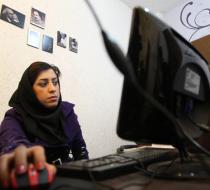A Startup's Tool Helps Evade Iran's Censors, for Now Favorite
BusinessWeek
By John Tozzi on April 11, 2012
In early 2011, David Gorodyansky watched the Arab Spring unfold on his company’s server logs. “We came into the office, we’d see that our usage in Egypt went from 100,000 to 1 million overnight,” says Gorodyansky, co-founder of AnchorFree. The 30-employee Mountain View (Calif.) startup makes free virtual private network (VPN) software which Internet users install on their computers to secure their connections and reach websites blocked by censors.
Egyptians turned to VPNs when the Mubarak regime blocked access to Facebook and Twitter, which activists used to share information and organize protests. Workarounds such as AnchorFree’s Hotspot Shield, which Gorodyansky says has been downloaded 60 million times since 2007, are becoming increasingly important for people in countries where the Web is censored, particularly as repressive regimes get better at blocking access.
Iran is building a national network that will be closed off from the global Internet and controlled by government censors. Yesterday the country denied reports that it plans to cut off access to the Internet once its Iranian intranet is in place.
If Iran does disconnect from the Internet entirely, VPNs would not help, says Eva Galperin, an activist with the Electronic Frontier Foundation, a nonprofit group in San Francisco that advocates for Internet freedom. “You simply cannot get out,” she says.
Blocking VPNs, which encrypt users’ transmissions and hide personally identifiable information such as IP addresses, is an extreme step, says Galperin. She also says the networks have been blocked on and off in Syria during the uprising there. (In February, Iran blocked access to Gmail and other sites, including through VPNs, ahead of parliamentary elections.) Cutting off VPNs to stifle citizens would also mean that foreign businesspeople who use the networks to connect to their corporate networks back home would be blocked. “That’s one of the reasons why governments are hesitant to block VPN,” Galperin says.
Another common workaround, known as Tor, protects users’ identities by routing data through a network of computers that don’t know the locations of other machines relaying data. Some governments have attempted to block the software, which was originally developed by the U.S. Naval Research Laboratory and now run by a nonprofit. “Tor is involved in this arms race with both China and Iran right now,” Galperin says.
More typically in such places as China or Turkey, where censorship is common, authorities filter sites based on their content. In those situations, Hotspot Shield and other VPNs allow Internet users to reach censored websites.
Gorodyansky launched Hotspot Shield in 2007, thinking its main user base would be business travelers who wanted to protect their connections at airports, hotels, and Starbucks. The next year “we saw millions of people starting to use our service from overseas, particularly in China, Southeast Asia, and the Middle East,” he says.
Now he estimates about half of Hotspot Shield’s users are in the U.S., Canada, and Europe, and the other half are in emerging markets, many of which fall victim to censorship. The company makes money from advertising on its free version or from premium subscriptions that cost $5 a month, or $30 a year.
Gorodyansky estimates there are 600 million Internet users around the world who are subject to censorship. Although he didn’t set out to make software for activists abroad, “we believe that social good and human rights and freedom can be a profitable business,” he says. “This is a huge business opportunity.”







